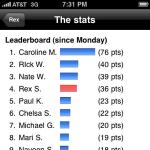There's a well-worn phrase in real estate: "location, location, location," meaning that where a property is located, alone, means more than anything else when it comes to assessing its value.
But "location" is getting new meanings in these days of smartphones and other hand-held devices.
When satellite-based global positioning and tracking became commonly available on computers and smartphones, sales of maps and requests for directions from strangers took a nosedive. We know of people who hardly go out of the house without first checking for GPS directions.
Some apps, or phone applications, even provide real-time alerts about traffic jams, accidents, and detours.

fimoculous, Flickr Creative Commons
Foursquare users are serious about keeping track of who's ahead in competitions to be most visible at certain venues.A new study by the Pew Research Center's Internet & American Life Project finds that 28 percent of adults use what it calls mobile and social-media "location services" every day. And not just to plan trips and get directions.
"Smartphone owners are using their phones to get fast access to location-relevant information on-the-go," said Kathryn Zickuhr, co-author of the Pew report.
What does that mean? Lots of smartphone owners get recommendations for restaurants, museums and theaters based on where they happen to be at the time. Young adults use so-called "geosocial" check-in services such as Foursquare and Gowalla, to keep track of friends' whereabouts and pick places to meet and eat.
Foursquare users can play a game in which rivals compete to become what they call the "mayor" of a place - even an office building or a post office - just by sending out a signal that they're in that particular location.
We're told that a security guard here, for instance, was the "mayor" of the Voice of America for a time, reviewing our visitors' tour and even the quality of our cafeteria food. We're scrolling our smartphones frantically to read that.
